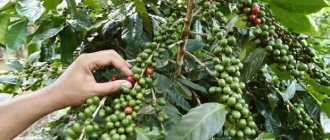In the modern world, people have increasingly begun to think about the dangers and benefits of certain foods. Many people strive to improve the functioning of the body, cleanse it of harmful substances, and remove animal products from the diet.
Among coffee fans, the question arose about replacing animal milk with something equally healthy, but of plant origin. So they started adding soy milk to coffee. Let's consider its beneficial and harmful properties, and also compare it with the benefits and harms of coffee with regular milk.
Everything you need to know about milk alternatives in coffee
Today, more and more people are abandoning animal milk. Some do it for ethical reasons, others for health reasons, and others follow fashion. Be that as it may, plant-based milk is confidently gaining popularity. Therefore, any modern coffee shop that strives to keep up with the latest trends cannot do without meatless alternatives. This will make the menu more varied and attract guests who, for one reason or another, have given up cow's milk.
We spent a lot of time testing plant-based analogues and ruined quite a few cups of coffee with them before we figured out what was what. And here is the main thing we managed to find out:
Does milk curdle into coffee?
In some coffees, most often those that are highly acidic, plant milk may curdle when heated above 60°C. Why this happens and how to prevent the cereal from curdling and curdling in your cup.
Two factors influence the coagulability of milk:
- pH level
- temperature.
Black coffee is more acidic (pH 5 or lower) than plant milk, with a pH of about 5.5. The acid in the coffee acts as a coagulant, creating the right environment for the formation of curd flakes, which sink to the bottom of the cup. Heat speeds up the process.
Choose a less sour variety
Some African grains are highly acidic, so if you're planning on adding plant-based milk to your cup, try brewing from Brazil, Peru, or Honduras.
Spice up your coffee
You can add water to strong espresso: this will reduce its acidity, the drink will remain homogeneous when mixed.
Let it cool down
Temperature increases acidity. To reduce it, cool your coffee before adding plant milk.
Don't overheat
Plant-based dairy products are very sensitive to temperature changes, to maintain optimal flavor and texture, it is best to heat it over low heat to around 60-62°C before churning. If we are talking about soy or coconut - no higher than 50°C.
Not all plant-based milk is created equal
Unlike cow's milk, plant milk can vary in composition. Almond, hemp and soy milk sound very healthy and progressive. But don't be fooled: In my research, I found that many barista-friendly alternative milks contain thickeners, sugar, and other chemical additives. Therefore, the next time you go to your favorite coffee shop, don’t be shy to ask to see a milk carton. Take a look at the ingredients and remember the manufacturer. A simple rule works here: the fewer ingredients and artificial sweeteners, the better. We especially recommend avoiding carrageenan - this substance causes irritation and inflammation of the gastrointestinal tract - Carrageenan consumption can also cause inflammatory bowel disease.
©CoffeeProjectTeam
If the composition does not satisfy you, do not forget to inform the barista about it. In small establishments, owners often work as baristas themselves. Or, as an option, ask to report suspicious ingredients to the management of the coffee shop. With this you will improve the life, health and taste sensations of other lovers of almond lattes and rice cappuccinos








